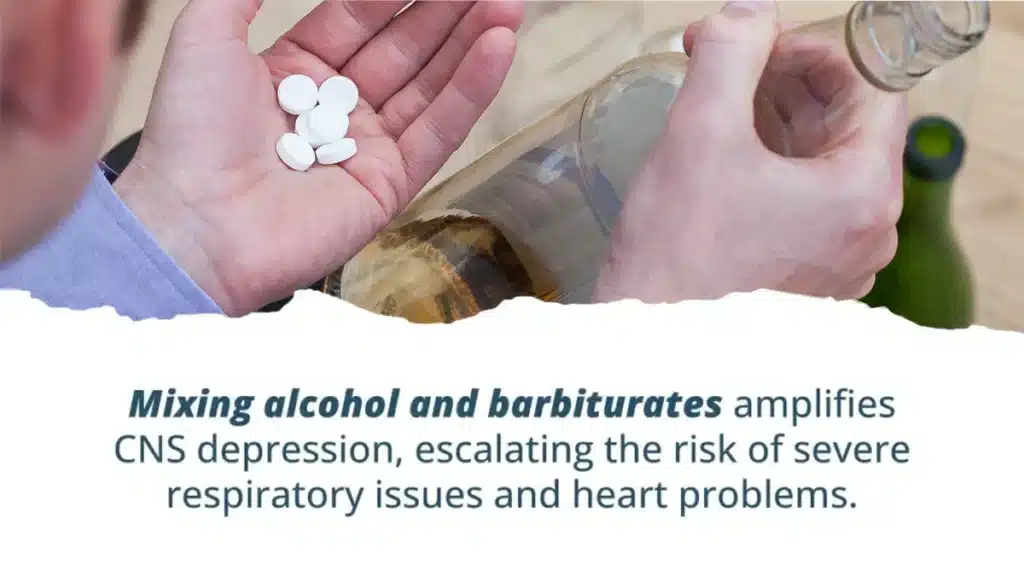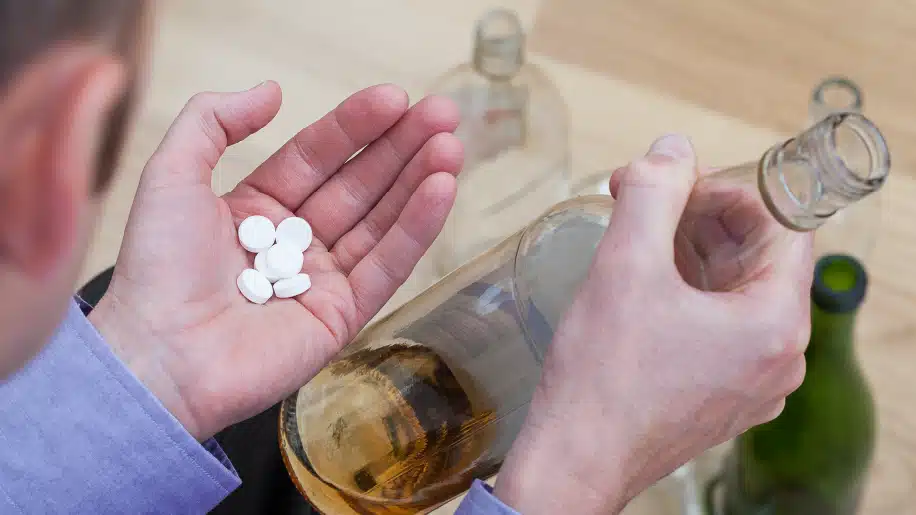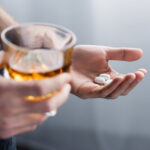Mixing alcohol and barbiturates is a dangerous combination. Barbiturates, a type of sedative, and alcohol both slow down the central nervous system (CNS). Combining these substances intensifies their effects, potentially leading to severe consequences.
This article will dig deeper into the specific risks associated with mixing alcoholic drinks and barbiturates, shedding light on the harm they can cause. In addition, it will explore the different treatment options to mitigate these potential dangers.
Key Takeaways
Mixing alcohol and barbiturate drugs makes a dangerous combination. Here is what you need to know about these two substances:
- Alcohol and barbiturates are central nervous system depressants, each with its effects on the body and mind.
- Mixing alcohol and barbiturates amplifies CNS depression, escalating the risk of severe respiratory issues and heart problems.
- Recovery from alcohol and barbiturate use disorder involves the combination of various approaches, such as detox and inpatient rehab.
Take the first step towards recovery from substance use disorder (SUD) by contacting The Haven Detox-South Florida at (561) 328-8627.

Effects of Alcohol on Body and Mind
Alcohol, a widely consumed substance, exerts a profound influence on both the physical and mental facets of an individual’s well-being. Here is how:
Physical Effects of Alcohol
Alcohol use significantly impacts the body, affecting various physiological functions. Firstly, alcohol acts as a CNS depressant, leading to slowed reflexes, impaired coordination, and decreased cognitive function. It also influences the cardiovascular system, causing a temporary increase in heart rate and blood pressure. Chronic alcohol use may result in liver damage, leading to conditions like cirrhosis.
Moreover, alcohol disrupts the gastrointestinal system, irritating the stomach lining and potentially causing gastritis or ulcers. Excessive drinking can weaken the immune system, making individuals more susceptible to infections. Additionally, alcohol is a diuretic, promoting fluid loss and contributing to dehydration, which can lead to headaches and fatigue.
Psychological Effects of Alcohol
Alcohol profoundly affects mental health, influencing mood, cognition, and behavior. Initially, it may induce feelings of relaxation and euphoria due to its impact on neurotransmitters like gamma-aminobutyric acid (GABA). However, excessive intake can lead to negative emotions, anxiety, and depression.
Alcohol impairs judgment and decision-making abilities, increasing the likelihood of risky behaviors. Chronic alcohol use is associated with cognitive deficits and memory impairment, impacting daily functioning. Long-term alcohol abuse can contribute to the development of alcohol use disorder (AUD) and exacerbate pre-existing mental health conditions like depression or anxiety.
Effects of Barbiturates on Body and Mind
Barbiturates significantly affect the physical and mental aspects of an individual’s health. Here’s how:
Physical Effects of Barbiturates
Barbiturates, a class of central nervous system depressants, produce a range of physical effects. Initially prescribed as sedatives or anticonvulsants, they induce relaxation and drowsiness. However, misuse can lead to significant physical consequences.
These drugs suppress brain activity, causing slowed breathing, low blood pressure, and impaired motor coordination. In higher doses, they can result in respiratory depression, leading to coma or even death. Prolonged use may also impact the liver and kidneys, potentially causing organ damage.
Psychological Effects of Barbiturates
Psychologically, barbiturates influence neurotransmitters in the brain, resulting in a calming effect. They can induce feelings of euphoria and reduce anxiety. However, abuse or excessive use can lead to severe mental impairment, including confusion, memory problems, and difficulty concentrating.
Prolonged use of barbiturates may lead to psychological dependence and addiction. Abrupt cessation after long-term use can trigger severe withdrawal symptoms, including anxiety, hallucinations, and seizures, making quitting challenging and potentially dangerous.
Combined Effects of Alcohol and Barbiturates
Combining alcohol and barbiturates is extremely dangerous and can lead to serious health risks, including withdrawal symptoms and overdose. Both alcohol and barbiturates depress the CNS, and their combined effects can be additive, potentially causing life-threatening consequences.
Here are the dangers associated with this combination:
Central Nervous System Depression
Both alcohol and barbiturates act as CNS depressants. When taken together, their combined effects can lead to excessive sedation, respiratory depression, and a significant decrease in heart rate and blood pressure.
Increased Sedation
Combining alcohol and barbiturates can intensify sedative effects, leading to increased drowsiness, confusion, and impaired motor coordination. This can put individuals at a higher risk of accidents and injuries.
Respiratory Depression
One of the most dangerous risks is respiratory depression. Both alcohol and barbiturates can suppress the respiratory system, leading to shallow or slowed breathing. In severe cases, this can result in respiratory failure, coma, and death.
Risk of Overdose
The risk of overdose significantly increases when alcohol and barbiturates are taken together. Alcohol and barbiturate overdose symptoms may include extreme drowsiness, confusion, difficulty breathing, and loss of consciousness. In severe cases, it can lead to a coma or death.
Withdrawal Symptoms
If an individual is dependent on both alcohol and barbiturates and suddenly stops or reduces their intake, withdrawal symptoms can be severe and life-threatening. These may include anxiety disorders, seizure disorders, hallucinations, and increased heart rate.
The effects of mixing alcohol and barbiturates can vary among individuals based on factors such as tolerance, age, weight, and overall health. What may be a lethal combination for one person might not have the same impact on another.
Treatment for Alcohol and Barbiturate Abuse and Addiction
Seeking treatment for alcohol and barbiturate abuse and addiction is a crucial step towards recovery. The process often involves a multifaceted approach that combines medical intervention, therapy, and ongoing support. Here are several effective methods:
Medical Detoxification
The initial step in treating alcohol and barbiturate abuse involves medical detoxification. This process is essential as it helps individuals safely manage symptoms of withdrawal under medical supervision. Abruptly stopping these substances can lead to severe complications, so detox is carefully managed to ensure the individual’s safety and comfort.
Rehabilitation Programs
Rehabilitation programs are essential for sustained recovery. Inpatient programs provide immersive, round-the-clock care in a residential setting, offering intensive therapy, support, and monitoring. Outpatient programs allow individuals to receive treatment while living at home, attending therapy sessions and support groups regularly, enabling them to maintain daily responsibilities.
Counseling and Therapy
Therapeutic interventions, such as cognitive-behavioral therapy (CBT), motivational interviewing (MI), and individual or group counseling, are integral parts of addiction treatment. These approaches help individuals understand their triggers, develop coping mechanisms, and modify behaviors associated with substance abuse.
Medication-Assisted Treatment (MAT)
Medication-assisted treatment (MAT) combines effective medications with therapy and support to treat dangerous addictions effectively. For alcohol addiction, medicines like naltrexone, acamprosate, and disulfiram can help reduce cravings and discourage drinking. However, barbiturate addiction treatment might involve a tapering schedule to reduce dependency safely.
Support Groups
Participating in mutual support groups, such as Narcotics Anonymous (NA) or Alcoholics Anonymous (AA), can be highly beneficial. These groups provide a strong sense of community, encouragement, and accountability. Sharing experiences with other people who understand the challenges of drug abuse can provide valuable support during recovery.
Frequently Asked Questions (FAQ)
What happens when alcohol and barbiturates interact in the body?
When alcohol and barbiturates mix, they magnify each other’s effects, leading to severe central nervous system depression. This combination significantly increases the risk of dangerous respiratory suppression, extreme sedation, and potentially life-threatening complications.
What should barbiturates not be mixed with?
Barbiturates should not be mixed with alcohol, opioids, benzodiazepines, antihistamines, or other CNS depressants. Combining them heightens the risk of severe respiratory depression, unconsciousness, and even fatal overdose due to the compounded effects on the body’s nervous system.
Are there treatment options available for individuals who are dependent on both alcohol and barbiturates?
Yes, treatment options exist for individuals dependent on both alcohol and barbiturates. Comprehensive programs offer medical detoxification, rehab, counseling, and medication-assisted treatment. Medical professionals and doctors tailor these approaches to address the complexities of dual dependence and support recovery from both substances.
The Haven Detox-South Florida: Where Healing Begins
Struggling with addiction to drugs like alcohol and barbiturates can be overwhelming. But within you lies the strength to weather it and create a brighter tomorrow. At The Haven Detox-South Florida, we aim to guide you toward that better day.
At our treatment center, your journey to recovery begins with our compassionate medical detox program. We guide your body through cleansing, paving the way for transformation.
Our 24/7 residential treatment program ensures round-the-clock support, blending medication, behavioral therapies, IV therapy, and holistic approaches. We’re not just treating addiction but empowering you to reclaim your life.
Take that vital step towards a healthier, happier life. Contact us at (561) 328-8627 today, and let our medical team help you regain control of your life.








